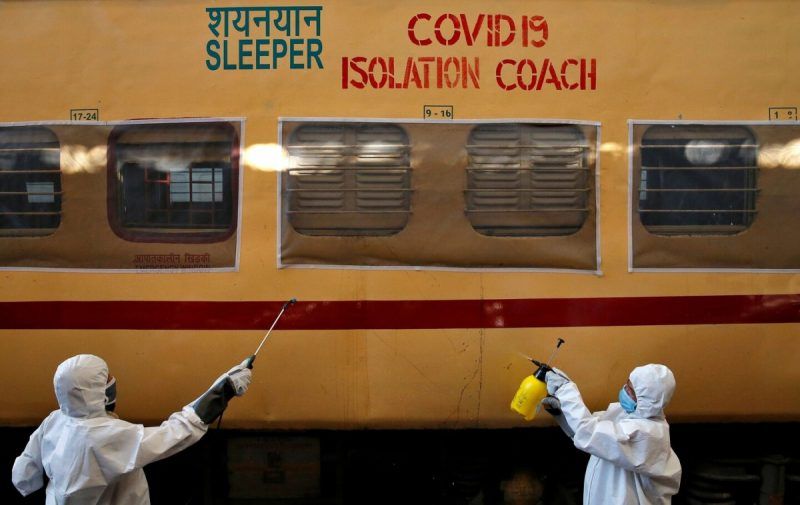
It didn’t take long before India’s response to the coronavirus was tainted by the kind of discrimination and Islamophobia that has characterized the nationalist administration of Prime Minister Narendra Modi. The hashtags #CoronaJihad and #BioJihad have inundated Twitter recently. It all stems from cases of covid-19 reported at a Muslim event.
On Sunday, the Indian government linked more than a thousand cases to the Tablighi Jamaat, a Muslim missionary group that held its annual meeting in a community center in Nizamuddin from March 8-10, days before India declared a health emergency and called for a national lockdown. While most people, including Muslims, agree that holding the annual meeting was irresponsible and endangered many lives, the event has faced a disproportional amount of criticism while generating a cascade of vitriol.
Virtually overnight, Muslims became the sole culprits responsible for the spread of the coronavirus in India.
Never mind that various religious groups held temple gatherings across India during the same period of time, putting many lives at risk. In the northern state of Madhya Pradesh, more than 25,000 people have been placed in quarantine after a man who traveled from Dubai performed Hindu rituals with 1,200 people on March 20.
According to Time magazine, tweets with the hashtag #CoronaJihad appeared nearly 300,000 times and were potentially seen by 165 million people. Other hashtags included #BioJihad.
Then the hate found official support when Mukhtar Abbas Naqvi, the union minority affairs minister in Modi’s cabinet, called the gathering by the Tablighi Jamaat a “Talibani crime”.
The attack line was enough fodder for many news channels. Fake stories started circulating of Muslims spitting on people to spread the virus. Muslims were said to be flashing their naked bodies at the female staff in hospitals. By the time the stories were debunked, they were already shared by millions of people.
In my own building, a neighbor wrote on the community WhatsApp group that Muslims objecting to Modi’s call to bang and applaud from balconies to mark the end of the day-long curfew must know that the Hindu majority had been tolerating the prayer call from the mosques for a lot longer.
India’s leading news channel, India Today, published a graphic that showed a skull cap and a face mask with a bold red virus over it, claiming Muslims contributed to a majority of coronavirus cases in India. Madhu Trehan, a leading editor in India who headed a prominent website called Newslaundry, also falsely said the Muslim congregation was responsible for 60 percent of cases in the country and mocked Muslims, saying “you can have your virgins”.
The toxic display of Islamophobia soon found its way into court orders. The high court of the western state of Gujarat on April 3 cited the Muslim congregation as the reason for the exponential growth of the pandemic in the country.
The hate peddled on our news channels and our social media has real consequences. A newborn child delivered in an ambulance reportedly died after a hospital refused to admit the family for being Muslim. The husband, Irfan Khan, told a newspaper, “My pregnant wife had to deliver a child. She was referred from Sikri to the Janana Hospital in the district headquarter but the doctors here mentioned that we should go to Jaipur because we are Muslim”.
On April 3, a Muslim man committed suicide after members of his village socially boycotted him for allegedly being in touch with members of the Muslim congregation in Delhi who had tested positive.
Of course, Islamophobia isn’t new. Just in February, New Delhi exploded in anti-Muslim riots that left more than 50 people dead. While our neighbor China battled the epidemic, India was in international headlines for the carnage flamed in part by hate speech given by leaders of Modi’s ruling party. Not a single culprit has been arrested. But it took just one day for the Indian police to slap the draconian National Security Act on members of the Muslim congregation.
On March 15, I wrote on my Twitter: “What is left for a virus to kill in a morally corrupt nation”. I was expressing despair and frustration at the hatred being peddled by members of the ruling party who had instigated the Delhi pogrom, at the culture of impunity that was all pervasive. The immediate provocation for the anger was miscarriage of justice against a human rights activist. The anger was directed at those in positions of power, those who had a public voice but chose to remain silent in the face of injustice. Liberals and right-wingers alike hauled me over the coals for calling the Delhi riots an anti-Muslim pogrom. A television anchor taunted me: “For once behave like an Indian and not a Muslim”.
I fear for all my fellow citizens, but I know many don’t feel the same way about me and my community.
In the past 10 days I have been reporting from the slums of India, where social distancing is a privilege many cannot afford. The threat of starvation, agony, the structural discrimination against the poor in the face of the pandemic is the need of the hour, a story that India and the world needs to hear and act on.
But now almost two weeks into a lockdown that threatens the life of every Indian, irrespective of faith, class, gender, I am being forced to write on prejudice and majoritarianism yet again, a subject I have raised consistently in this column.
It is unfortunate that during this global crisis, when we should be putting all hate aside, my country and its leaders force me to focus on prejudice yet again, revealing an acute and disturbing crisis of morality.
Rana Ayyub is an Indian journalist and author of “Gujarat Files: Anatomy of a Cover Up”.
